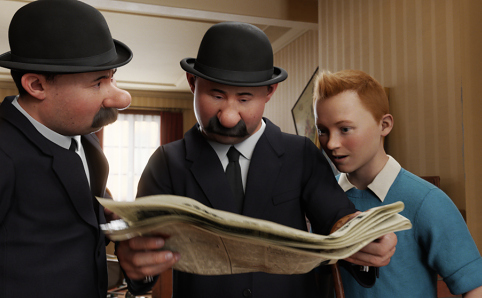The Adventures of Tintin:
The Secret of the Unicorn
It's no secret that Steven Spielberg has been a long time fan of this smartly dressed teen's adventures; the story goes that when a critic compared Raiders of the Lost Ark to Tintin, Spielberg's curiosity got the better of him so he went off and bought loads of the comic by the character's Belgian creator Hergé. He became such a fan that he bought the film rights to the series after Hergé's death in 1983.
Having bought the rights it was Spielberg's intention to shoot a live-action film, but after discussing his plans more recently with Peter Jackson, was persuaded to go the animated motion capture route. But can a character that first appeared in 1929 appeal to modern audiences?
Whilst out doing a spot of browsing, Tintin (Jamie Bell) and his faithful mutt Snowy come across a model of ship called The Unicorn. Within moments of buying it, another man attempts to purchase it from Tintin, for more money than he paid for it. There's something about the model that Tintin likes however, so he turns the gentleman down. Not long after, another gentleman by the name of Sakharine (Daniel Craig) offers even more money for the ship, but to his surprise, Tintin still refuses to budge. The reporter in Tintin starts to think that there's more to this particular model than meets the eye.
This theory of Tintin's is reinforced when he returns home one day to find that his most recent purchase has been stolen. Its disappearance only inspires Tintin to ask more questions and to pursue his investigation further. But not even Tintin is aware of the incredible adventure that awaits himself and Snowy.

Hmmm. It reads "We are detective. We are select. We are detective. Come to collect". Now what does that mean?
Within minutes of the film's start, your brain may well become slightly confused: is this an animated film or a live action one? It may sound a silly question to ask, particularly when you already know the answer, but the incredible detail in evidence in this film is truly remarkable. Many of the characters in it look more human than a number of Hollywood stars. Take Captain Haddock (Andy Serkis) for example; at certain points you can not only see the fluff on his lived-in naval jumper in startling clarity in stunning detail, but also even the his protruding nose hairs in his right nostril.
But it's not just the characters that look larger than life; the environments in which they interact are breathtakingly real. To say that this is no ordinary cartoon is a massive understatement.
To begin with, it once again begs the question, is there any real point in creating something so lifelike, when creating a live action version would do just as well? Why should a hideously expensive form of art go to so much trouble and effort in recreating life when the same thing can be done by real actors?
And then something strange happens about halfway through the film. Something very scary indeed. Something almost unimaginable. You could easily start to consider that this film heralds the death knell to all live action films. You forget that it's an animated film and just accept it for being a film. But it's no ordinary film. This is film 2.0.
Hopefully it's just technical smoke and mirrors at the hands of a modern day master of cinema playing with all our heads. It's easy to be blown away by the visual voodoo, but Spielberg doesn't do it at the expense of his story. He's got a mighty triumvirate of British talent on board to flesh out the screenplay: Steven Moffat (head writer forDoctor Who), Edgar Wright (director of Shaun of the Dead and Hot Fuzz) and Joe Cornish (of Adam and Joe fame, and director of the recent Attack the Block). The only real surprise about these three writing together is that it didn't create an inter-dimensional portal unleashing an attack from zombies and aliens upon this very Earth.
The only niggling problem is that perhaps the film is slightly overwritten and the plot is a little complex. This might be a blessing for some parents, who could use it as a meter of intelligence for their offspring; if their children come out of it without asking questions, they've probably got a bright future ahead of them. If they come out of it scratching their heads, parents may have to lower their expectations. This test can also be used in the same way with partners or friends you take along to see it.
As far as Tintin being relevant to today's audiences concerned, it's not a major issue. Fans of the comic book character should be suitably impressed with his transition to the big screen, whilst those not familiar with his comic adventures would be hard pushed not to be absorbed by Belgium's answer to Indiana Jones. Yes, Tintin may well be tediously bourgeois (in much the same way as the Famous Five were, with their lashings of ginger beer), but the vibrant world he lives in, and the curiously charming characters that inhabit it, manage to water down his middle class-ness to bearable levels.
Besides, the film is a veritable rollercoaster ride from the off, rarely slowing down for breath. It has the kind of set pieces that would have a James Bond film cursing heavily in the corner, wishing it had had them first.
This is Spielberg doing what he does best, delighting audiences young and old on a grandiose scale. And yes, it's probably the best 'cartoon' ever made.
